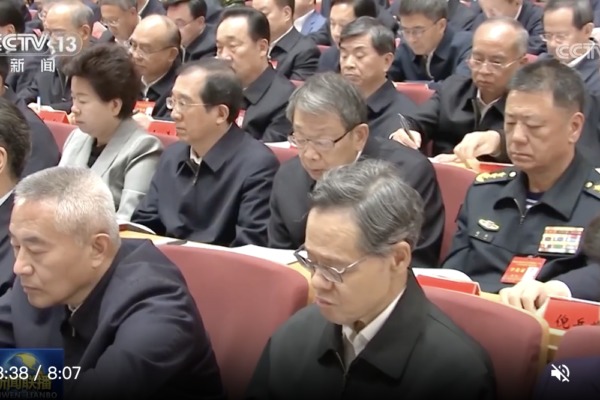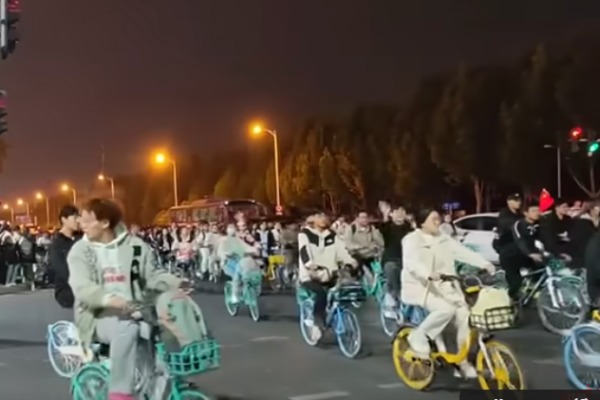Former CCP Guizhou Provincial Party Secretary Sun Zhigang. (Dajiyuan Composite Image)
November 19, 2024 – Former CCP Guizhou Provincial Party Secretary Sun Zhigang was sentenced to death with reprieve last month on bribery charges. Analysis of the case suggests that Xi Jinping’s ally Xu Lin leveraged the exposure of Guizhou’s debt crisis to remove Sun and other high-ranking officials. However, one of Sun’s charges was deliberately omitted due to its extensive and high-level implications, causing the authorities to exercise caution.
In recent years, numerous corrupt officials in Guizhou have been removed from office. Among them, three were vice-chairpersons of the provincial political consultative conference: Li Zaiyong, Zhou Jiankun, and Chen Yan. Prior to this, the former chairman of the Guizhou Provincial Political Consultative Conference, Wang Fuyu, also fell from grace. Over the tenures of three successive Guizhou Provincial Party Secretaries — Chen Miner, Sun Zhigang, and Shen Yiqin — nearly 100 provincial and municipal-level officials were promoted, many of whom have since been taken down. Among them, Sun Zhigang was the highest-ranking official to fall.
On October 29, 2024, Sun Zhigang was sentenced to death with reprieve for bribery. Sun served as Guizhou’s governor starting in October 2015 and as provincial party secretary until November 2021. His successor, Shen Yiqin, handed the position over to Xu Lin in December 2022.
Xu Lin, formerly Shanghai’s propaganda chief, was a close ally of Xi Jinping during Xi’s brief leadership of Shanghai. After Xi came to power, Xu held various positions, including deputy head of the CCP Central Propaganda Department, director of the Central Cyberspace Affairs Commission, director of the State Internet Information Office, and deputy director of the State Council Information Office.
A recent commentary by Gao Xin on the Radio Free Asia website noted that Xu Lin, aiming to use his five-year tenure as Guizhou Party Secretary to build a track record and pave the way for a promotion to vice-national-level status at the 21st Party Congress, focused his efforts on "preventing a full-scale return to poverty" and "resolving the province's severe debt crisis," effectively cleaning up the mess left by his predecessors.
According to reports, local media, following Xu’s directive to "make the difficulties clear," disclosed that Guizhou’s debt had exceeded 1.5 trillion RMB (not including hidden liabilities). By comparison, the province’s annual general budget revenue is only around 200 billion RMB.
Furthermore, in April last year, the Guizhou Provincial Development Research Center published a "Provincial Debt Issue Research Report," openly appealing to the State Council for assistance. The report stated that Guizhou was deeply entrenched in a debt crisis and was incapable of self-rescue, requesting support and solutions from higher authorities.
According to Gao Xin’s article, Xu Lin, skilled in "propaganda" and backed by Xi Jinping, dared to do what other provincial leaders would not even consider: he openly exposed and publicized the debt crisis in his jurisdiction. This move directly threatened Sun Zhigang.
Gao noted that after Xu Lin took over Guizhou, he conducted "assessments" on problematic officials left behind by Chen Miner, Sun Zhigang, and Shen Yiqin, including then-Vice Chairman of the Guizhou Political Consultative Conference Li Zaiyong. Xu found evidence that Li had recklessly incurred debts to create "political achievements," and that Sun Zhigang had consistently praised and promoted him. With these findings, Xu ordered the public disclosure of Guizhou’s severe debt crisis, which was beyond the province’s ability to resolve. Xu’s appeal to Premier Li Qiang’s State Council aimed to shift blame away from himself and force accountability for the debt crisis onto his predecessors.
Gao’s article pointed out that the CCP’s Central Commission for Discipline Inspection (CCDI) report and the prosecutor’s indictment both avoided charging Sun Zhigang with "abuse of power." In contrast, Li Zaiyong, who was imprisoned before Sun, and Qin Rupei, who was jailed later, were both held accountable for "abuse of power" due to illegal borrowing. The Xi administration’s reluctance to publicly pursue Sun for "abuse of power" likely stems from fears of a "domino effect," which could draw public scrutiny to current high-ranking officials such as Chen Miner and Shen Yiqin.
Chinese economist Mei Xinyu has pointed out that the period from 2015 to 2020 saw the fastest growth of Guizhou’s local debt. During this time, Sun Zhigang was in charge of the province and should bear undeniable responsibility. Gao emphasized that over these five years, Chen Miner served as Party Secretary while Sun Zhigang was Governor, followed by Sun as Party Secretary and Shen Yiqin as Governor. If responsibility were to be fairly assigned, all three should apologize to the people of Guizhou for the debt crisis.
Gao further argued that holding a provincial Party Secretary accountable for "abuse of power" due to reckless borrowing for large-scale "vanity projects" could inevitably lead to comparisons with Xi Jinping’s own unfinished Xiong’an New Area project.
Editor: Ning Feng











News magazine bootstrap themes!
I like this themes, fast loading and look profesional
Thank you Carlos!
You're welcome!
Please support me with give positive rating!
Yes Sure!